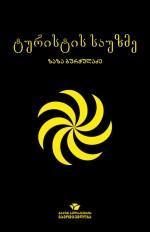Zaza Burchuladze’s Tourist’s Breakfast is an example of documentary, autobiographical prose, although the text is also written in such a way that you never fully understand whether the stories he tells are invented or true. In this novel ZazaBurchuladze describes a period of living in Berlin. The main hero has worrying health problems, he has treatment, he often goes for walks in the city with his little daughter and his wife, and he recalls the Georgian environment which he left behind some years previously. He seems spontaneously to remember certain stories, but these episodes, as a whole, are subordinate to a specific system which takes into account his isolation in Berlin. An endeavour emerges by which the author, as an artistic plan, has sentenced himself to a stay in Berlin. Berlin’s streets, its parks, its surroundings shape the book’s aesthetics, and it now is turned into a somehow claustrophobic, enclosed space. This enclosed nature is something he needs in order to look with new eyes at a Georgia which is saturated with unenclosed, collective considerations and passions, in order to create a distancing effect. In A Tourist’s Breakfast his homeland is seen from several different angles. ZazaBurchuladze offer us his own chronicle of Georgia’s historical events, both Soviet and post-Soviet, sometimes examining such phenomena as, for example, a Georgian funeral and requiem, sometimes telling us his own adventures, sometimes casually giving us simple line portraits of actual people. Real non-Georgian characters appear, so as to provide the author with certain associations, and then immediately disappear. For example, ZazaBurchuladze writes that he had a wild coffee-drinking time with the Russian writer Sorokin. This reminds him of a typical Soviet dinner and over several pages he gives us a detailed description, or he recalls how some photographer at the Frankfurt fair got the Ukrainian writer Yuri Andrukhov to be photographed and suddenly gave off the smell of the villager Granny Keto. Following this smell, he recalls Granny Keto, until the photographer calls out ‘Enough!’ These montage effects make the book dynamic. as a whole, just like a book which is full of details, a series of pictures. And also of characters.ZazaBurchuladze draws his surroundings, objects, people, sometimes with good humour, sometimes with sarcasm, but, which is important, there is always an unexpected effect, one always feels the forces of metaphor. On the one hand, this is a book of personal experience and reflections, but at the same time it offers us a text with is socially acute.
'I very much liked the fact that Zaza did not write a sensational book after moving to Berlin, some tragic story of a refugee writer. He has told his life: he has a great deal to tell of what he has had in this enclosed space, so that above all he examines a lot of things in his own head. In a word, I am still reeling under the impression, and I think that, like every book by Zaza, this is something very different.'
Lasha Bughadze, author
‘Sometimes I think what a darling I am,’ someone bursts out to Zaza, and it really is like that: he is very appealing in this book, because of his sincerity, is way of thinking, his sudden spurts of humour and carefreeness and, of course, his sharp teeth always slips out in this humour or carefreeness.'
Shota Iatashvili, critic
'Zaza Burchuladze has not deviated from his custom of the last decade: once again he has created a masterpiece. The text called A Tourist’s Breakfast is, above all, a monument of so-called word-play literature, naturalistic and humanist, contemporary to naturalism — the most unusual things are naturalistically, naturally portrayed and the reader, too, has to adopt a nil admirari—be amazed by nothing — pose and see things from the point of ancient humanism (where man is the measure of everything), or from a mediaeval stance (man, not God, is in the centre of the universe). The author has got to the prize-winning finishing line, although there is no literary prize in the world which would be awarded to this text. If there really was before this book was written just a ‘not-yet’ writer available for evaluation, quantitatively or qualitatively (he could say I’m the author of half a novel). the ‘afterwards’ writer is by now the author of two and a half novels. The Breakfast written in Berlin ought to be counted as two novels by the writer, just as formerly prisoners at the polar circle had one day counted as two.'
Levan Berdzenishvili, critic
Extract will be available soon
In case of using the information, please, indicate the source.
